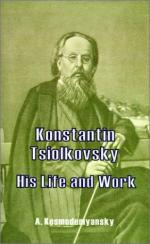|
This section contains 299 words (approx. 1 page at 300 words per page) |
 Konstantin Tsiolkovsky was a pioneer in space and rocket research.
Konstantin Tsiolkovsky was a pioneer in space and rocket research.
Russian Physicist and Rocket Pioneer 1857-1935
Konstantin Tsiolkovsky was one of the three most important early pioneers of rocketry, together with American Robert H. Goddard and German Hermann Oberth. Partially deaf since childhood because of a bout with scarlet fever, Tsiolkovsky was a Russian schoolteacher who taught himself physics and the mechanics of rocket propulsion. In his spare time, he wrote both technical papers and speculative science fiction stories.
Tsiolkovsky realized that, unlike aircraft, rockets had the ability to travel the empty realms of space, and he foresaw trips to the Moon and even considered the phenomenon of weightlessness. Tsiolkovsky also imagined Earth satellites and space stations. This was long before such ideas could actually be implemented.
One of Tsiolkovsky's most important achievements was to work out the theory of rockets, in which a vehicle's maximum velocity can be expressed as a function of its mass and the speed of its exhaust gases. But this theoretical work also convinced him that single-stage rockets, even if they burned energetic fuels such as liquid hydrogen and oxygen, would not be powerful enough to escape from Earth. He therefore proposed the use of multistage vehicles. These vehicles consist of stacks of rockets, in which a smaller vehicle is mounted on a larger one. In the early twenty-first century, satellites and planetary probes are routinely shot into space on multistage rockets.
Although largely ignored during his lifetime, Tsiolkovsky's work was finally recognized as the space age got underway. He is often called the Father of Space Travel, and in 1959 his name was given to a crater on the farside of the Moon.
See Also
Goddard, Robert Hutchings (Volume 1);; Oberth, Hermann (Volume 1);; Rockets (Volume 3); Von
Internet Resources
|
This section contains 299 words (approx. 1 page at 300 words per page) |


